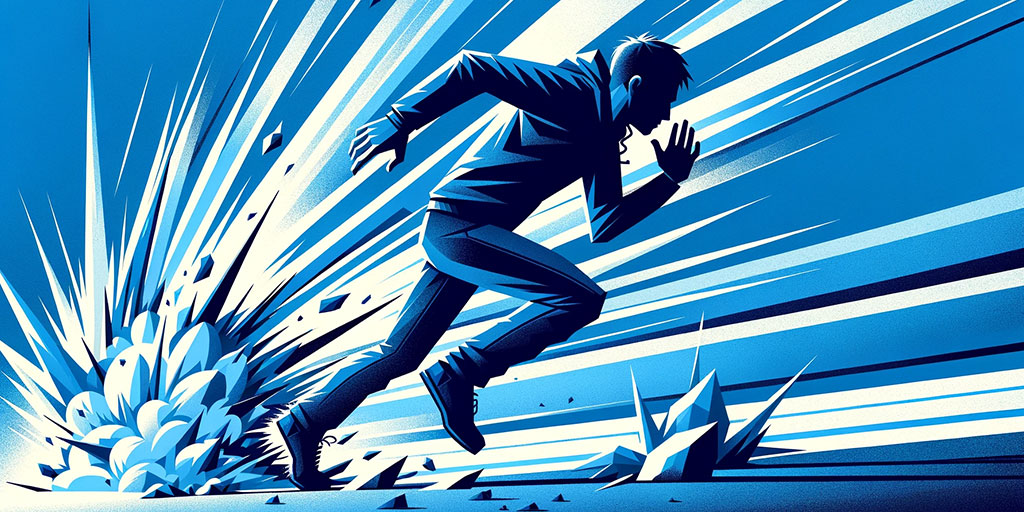Picture this: You’re on a writing adventure, and you’re armed with a quiver full of arrows. These arrows are your words, your tools of the trade. But what if I told you that not all arrows are created equal? Some are dull, while others are sharp, gleaming, and ready to pierce the hearts of your readers. Which ones would you choose?
That’s right, you’d go for the most lethal, the most captivating, the most powerful arrows in your arsenal. In the world of writing, these arrows are known as strong verbs.
Now, buckle up and join me as we embark on a journey to uncover the secrets behind these magical linguistic weapons. Together, we’ll learn how to wield strong verbs like a pro and transform your piece of writing into a riveting masterpiece. Are you ready to become a true wordsmith? Let’s dive in!
What Are Strong Verbs?
Strong verbs are specific, precise words that convey a clear action or emotion. They paint a vivid picture in the reader’s mind, making your writing more dynamic and compelling. Strong verbs stand on their own, without the need for adjectives or adverbs, and they often replace weaker, more generic verbs.

Strong verbs are essential for creating a vivid, immersive experience for readers. They serve as the driving force behind the action, helping to bring characters (whether they are round or flat characters) and scenes to life. With the right choice of verbs, writers can paint a picture that is both engaging and emotionally resonant, allowing readers to become invested in the story.
In addition to their impact on storytelling, strong verbs offer a range of benefits that can enhance your writing overall:
- Clarity: Strong verbs provide clear, concise descriptions of actions, making it easier for readers to understand your message.
- Engagement: Powerful verbs draw readers in, keeping them interested and invested in your content.
- Emotion: Vivid verbs help evoke emotions, allowing readers to connect with your writing on a deeper level.
- Pacing: Using strong verbs can enhance the pacing of your narrative, sustaining momentum and ensuring a smooth flow.
- Variety: A diverse range of verbs prevents your writing from becoming repetitive, helping your readers to maintain their levels of attention.
- Impact: Strong verbs create powerful imagery, leaving a lasting impression on readers and making your content memorable.
Craft of Writing Quiz (Easy)

Strong Verbs vs. Weak Verbs
While strong verbs are specific, vivid, and powerful, weak verbs are vague, generic, and lack the impact needed to hold a reader’s attention.

Weak verbs tend to dilute the message and make the writing less dynamic. In contrast, strong verbs help paint a clear picture, allowing readers to visualize the action and connect with the story emotionally. By replacing weak verbs with their stronger counterparts, you can significantly improve the quality and impact of your writing.
Here are five examples of weak verbs and useful strong verbs that can replace them:
Weak Verbs | Strong Verb Variations |
|---|---|
Look | Gaze, Glance, Stare, Peek, Scan |
Touch | Caress, Stroke, Tap, Graze, Poke |
Talk | Whisper, Shout, Mumble, Chatter, Exclaim |
Laugh | Giggle, Chuckle, Snicker, Guffaw, Cackle |
Walk | Stroll, Stride, Amble, Saunter, March |
3 Types of Weak Verbs to Replace
Recognizing weak verbs in your writing is the first step towards creating more vivid content. Here are three common types of weak verbs to look out for in your writing.

1. State-of-Being Verbs
State-of-being verbs often contribute to weak writing as they lack action or specificity. These verbs include:
- Is
- Am
- Are
- Was
- Were
- Be
- Being
- Been
- Have
- Has
- Had
- Do
- Does
- Did
- Shall
- Should
- Will
- Would
- May
- Might
- Must
- Can
- Could
Replacing state-of-being verbs with strong action verbs can enhance clarity and make your writing more engaging.
Examples:
Weak: The storm is fierce.
Strong: The storm ravages the coastline.
Weak: He does everything his boss tells him to do, although he dislikes him.
Strong: Despite his aversion for him, he always obeys his boss.
Weak: They had a secret now.
Strong: They remained silent about it and never shared the story with anyone.
2. Verbs That Rely on Adverbs
When a verb needs an adverb to provide additional information, it’s often a sign of a weak verb. Replacing the verb-adverb combination with a single, stronger verb can make your writing more concise and impactful.
Examples:
Weak: She opened the door quietly.
Strong: She tiptoed through the door.
Weak: He looked around analytically.
Strong: He examined the room and those in it.
Weak: The horse moved quickly.
Strong: The horse galloped across the field.
3. Verbs With -ing Suffixes
Verbs with an -ing suffix can sometimes weaken your writing, particularly when they create a continuous tense or a gerund that isn’t necessary. Replacing them with a simple present or past tense verb can make your writing more direct.
Examples:
Weak: The leaves were rustling in the breeze.
Strong: The leaves rustled in the breeze.
Weak: She was hesitating before making her decision.
Strong: She hesitated before making her decision.
Weak: The sun was setting behind the mountains.
Strong: The sun set behind the mountains.
The Ultimate Strong Verbs List
Unlock the potential of your writing with our handpicked selection of strong verbs. These powerful words will serve as inspiration for you to craft vivid, compelling stories that grab your readers’ attention.
- Abduct
- Absorb
- Accelerate
- Accomplish
- Accumulate
- Ache
- Achieve
- Activate
- Admire
- Adore
- Adorn
- Advance
- Advise
- Aggravate
- Agitate
- Allure
- Alter
- Ambush
- Amend
- Amplify
- Annihilate
- Appall
- Apprehend
- Arouse
- Arrange
- Ascend
- Assault
- Astonish
- Attack
- Baffle
- Balance
- Balloon
- Banish
- Barricade
- Bash
- Batter
- Beam
- Beef
- Beguile
- Belabor
- Belittle
- Bellow
- Bequeath
- Berate
- Beseech
- Beset
- Besmirch
- Bewilder
- Bewitch
- Blab
- Blast
- Blaze
- Blister
- Blitz
- Bloom
- Blunder
- Bolster
- Bolt
- Boost
- Bound
- Brandish
- Breach
- Brief
- Bristle
- Broach
- Broadcast
- Brood
- Burst
- Bus
- Bust
- Cackle
- Cajole
- Capture
- Caress
- Catch
- Cavort
- Challenge
- Chap
- Charge
- Chastise
- Cherish
- Chip
- Churn
- Clasp
- Cleave
- Climb
- Clout
- Clutch
- Coax
- Coddle
- Collide
- Combust
- Command
- Commiserate
- Commune
- Conceal
- Conceit
- Confront
- Conjure
- Conquer
- Constrict
- Consume
- Contemplate
- Contend
- Contort
- Contrive
- Convulse
- Covet
- Cower
- Crackle
- Crash
- Crave
- Cripple
- Crumble
- Crumple
- Crush
- Dangle
- Dash
- Dawdle
- Dazzle
- Debilitate
- Decimate
- Decipher
- Decry
- Deface
- Deflate
- Deflect
- Defy
- Deliver
- Deluge
- Delve
- Demolish
- Demoralize
- Demure
- Denounce
- Depart
- Depict
- Deplete
- Deplore
- Deposit
- Deride
- Desecrate
- Desire
- Desolate
- Despise
- Despoil
- Detect
- Deter
- Deteriorate
- Devastate
- Develop
- Deviate
- Devise
- Devour
- Direct
- Discern
- Discover
- Disintegrate
- Dismantle
- Dispatch
- Disperse
- Disrupt
- Dissect
- Dissipate
- Dissolve
- Dissuade
- Distract
- Diverge
- Dominate
- Drag
- Drain
- Drip
- Drop
- Dwindle
- Eavesdrop
- Eclipse
- Efface
- Elicit
- Elope
- Elude
- Emanate
- Embark
- Embitter
- Embody
- Embolden
- Embrace
- Emerge
- Empower
- Enchant
- Encompass
- Endure
- Engage
- Engulf
- Enlarge
- Enrage
- Ensnare
- Entangle
- Enthrall
- Entice
- Entrust
- Entwine
- Envelop
- Eradicate
- Erase
- Erode
- Escort
- Evade
- Evaporate
- Evict
- Eviscerate
- Exacerbate
- Exalt
- Excoriate
- Exhale
- Exhilarate
- Expand
- Explode
- Explore
- Expose
- Express
- Extend
- Extinguish
- Extract
- Extricate
- Eyeball
- Falter
- Fathom
- Fester
- Fight
- Finesse
- Fish
- Flail
- Flare
- Fling
- Flit
- Flounder
- Flourish
- Fly
- Forgive
- Foster
- Frown
- Fuse
- Gallop
- Garble
- Gaze
- Glare
- Gleam
- Glisten
- Glitter
- Goad
- Gobble
- Govern
- Grapple
- Grasp
- Gravitate
- Grieve
- Grip
- Groan
- Grope
- Growl
- Guide
- Gush
- Hack
- Hail
- Haunt
- Heighten
- Hesitate
- Hobble
- Hover
- Hurry
- Ignite
- Illuminate
- Imbue
- Immerse
- Impart
- Implode
- Incinerate
- Inflict
- Inhabit
- Inhale
- Inspect
- Instigate
- Instruct
- Integrate
- Intensify
- Interact
- Intertwine
- Intrigue
- Inundate
- Invent
- Invigorate
- Invoke
- Jeopardize
- Jostle
- Journey
- Kindle
- Lash
- Launch
- Lead
- Leap
- Linger
- Locate
- Lurch
- Lurk
- Magnify
- Meander
- Mimic
- Mint
- Moan
- Modify
- Mourn
- Multiply
- Muse
- Mushroom
- Mystify
- Navigate
- Notice
- Notify
- Nourish
- Obliterate
- Obtain
- Oppress
- Order
- Overcome
- Overwhelm
- Paint
- Park
- Peck
- Peek
- Peer
- Perceive
- Persevere
- Persuade
- Pervade
- Picture
- Pilot
- Pinpoint
- Place
- Plant
- Plop
- Pluck
- Plunge
- Poison
- Pop
- Position
- Possess
- Power
- Prickle
- Probe
- Prune
- Quicken
- Ravage
- Realize
- Recite
- Recoil
- Refashion
- Refine
- Rekindle
- Relinquish
- Remove
- Renounce
- Report
- Repress
- Resurrect
- Retaliate
- Retreat
- Reunite
- Reveal
- Reverberate
- Revitalize
- Revolutionize
- Revolve
- Rip
- Rise
- Ruin
- Rush
- Rust
- Saunter
- Savor
- Scamper
- Scan
- Scold
- Scorch
- Scrape
- Scratch
- Scrawl
- Seize
- Serve
- Shatter
- Shepherd
- Shimmer
- Shine
- Shiver
- Shock
- Shrivel
- Shun
- Simmer
- Sizzle
- Skip
- Skulk
- Slash
- Slide
- Slink
- Slip
- Slump
- Slurp
- Smash
- Smite
- Smolder
- Snag
- Snarl
- Sneak
- Snowball
- Soar
- Spam
- Sparkle
- Sport
- Sprinkle
- Stare
- Starve
- Steal
- Steer
- Storm
- Strain
- Stretch
- Strip
- Stroll
- Struggle
- Stumble
- Sulk
- Summon
- Supercharge
- Supersize
- Surge
- Survey
- Swell
- Swelter
- Swipe
- Swoon
- Tail
- Tantalize
- Tattle
- Thrive
- Toddle
- Transform
- Treat
- Tremble
- Trim
- Trip
- Trudge
- Tussle
- Uncover
- Unearth
- Unravel
- Untangle
- Unveil
- Usher
- Vanish
- Veil
- Venerate
- Wail
- Waver
- Weave
- Weep
- Whisk
- Wind
- Withdraw
- Wither
- Wreck
- Wrench
- Wrest
- Wrestle
- Wring
- Yank
- Yearn
- Zap
- Zing
Tips & Tricks for Using Strong Verbs
Using strong verbs can significantly elevate your writing, making it more vivid and intriguing for readers. Here are some practical tips and tricks to help you incorporate strong verbs into your writing effectively.

Read Widely
One of the best ways to develop a robust vocabulary, including a wide range of strong verbs, is to read widely. By exposing yourself to various genres and styles, you’ll naturally come across new verbs and expand your understanding of their usage.
Vary Your Verbs
While it’s essential to use strong verbs, be mindful not to overuse the same verbs repeatedly. Overusing a specific verb can make your writing monotonous. Instead, try to mix up your strong verbs list to keep your readers hooked. Experiment with different verbs to see which ones best convey the actions, emotions, and energy in your writing.
Convey Emotions
Strong verbs can evoke powerful emotions and create vivid images in the reader’s mind. Think about how a verb can convey the emotional intensity of a scene or action. For example, instead of using “said”, consider using more expressive verbs like “whispered,” “murmured,” “bellowed,” or “shouted” to add depth and emotion to your writing. This is important in any genre, but is crucial in stories where the inner world and perception of the characters carry the weight of the plot, such as romance novels or horror stories.
Use Active Voice
Incorporating strong verbs often goes hand-in-hand with using the active voice. The active voice makes your writing more engaging and direct, as it focuses on the subject performing the action. This emphasis on action can also help you select more powerful verbs. For instance, instead of writing “The letter was read by Emma,” write “Emma tore open the letter, her eyes racing across the words.” The active voice and the strong verbs “tore” and “racing” make the sentence more dynamic.
Revise and Edit
Finally, remember that strong verbs are often discovered during the revision and editing process. As you go through your drafts, keep an eye out for opportunities to replace weak verbs with more compelling options. Use your growing knowledge of vivid verbs to transform your writing, and don’t be afraid to make changes to enhance your prose.
Craft of Writing Quiz (Hard)








